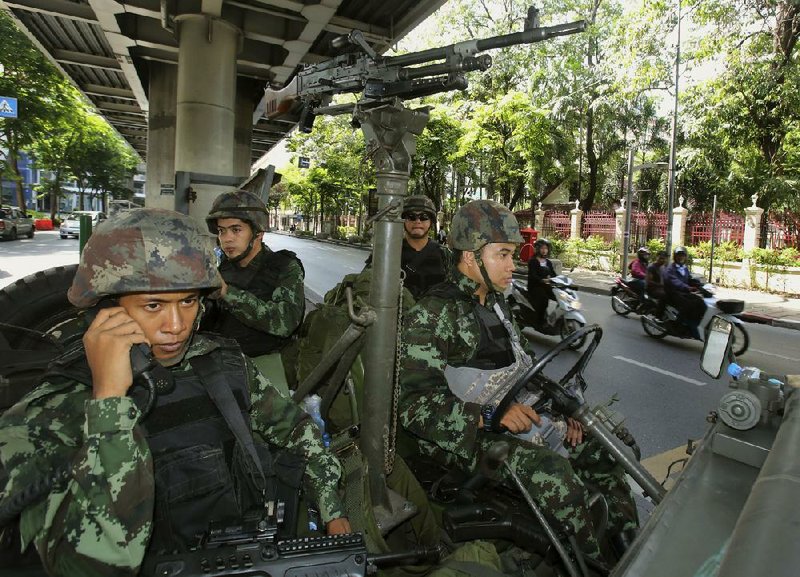BANGKOK -- Thailand's caretaker premier called Tuesday for the military to avoid violence as the army chief imposed martial law after more than six months of political turmoil.
"There must be no violence, no bias, equality for all parties and it should comply with the rule of law," Prime Minister Niwattumrong Boonsongpaisan said in a statement, referring to the army's efforts to quell protests. "The army's action must be under the constitution with the king as the head of state."
The imposition of martial law nationwide is not a coup, Army Chief Prayuth Chan-Ocha said on local television. The army is seeking to restore order and is asking political groups to halt their protests, he said. There was an increased presence of soldiers and military vehicles in the capital, Bangkok, though no curfew had been imposed.
"There will be a center to control order, headed by the army chief," Prayuth said. "The center can enforce any law under the martial law act to control the situation effectively."
The move is the army's most direct involvement in the Southeast Asian nation's politics since 2006, when then-premier Thaksin Shinawatra was removed in a coup. Martial law already is in place in parts of southern Thailand.
Political polarization has escalated in the past decade over the role of Thaksin and his allies in a nation that has had 11 coups since the end of direct rule by kings in 1932. Thailand has been without a fully functioning government since December, when then-premier Yingluck Shinawatra, Thaksin's sister, called snap elections in a bid to ease the unrest.
"I will try to prevent any riots and bloodshed," Prayuth said Tuesday in Bangkok. "We will also refrain from any violation of human rights," he said. "I invite all parties for talks to end the conflict."
Anti-government protesters halted planned rallies Tuesday to assess the army's decision, said Akanat Promphan, a spokesman for protest leader Suthep Thaugsuban.
The army said in a statement that it would ban the broadcast of news that could "trigger fear among the public" and would take 11 satellite TV and radio stations off the air, including Bluesky, which is affiliated with the opposition Democrat party.
"This seems like a state of emergency rather than a coup," said Gavan Butler, an honorary associate with the University of Sydney's Department of Political Economy who also teaches at Thammasat University in Bangkok. "It's a limited action, not a signal for a coup, which the army has been signaling for months that it wants to avoid. Thais don't get too fussed over a state of emergency. People will try to live their life as though not much has happened."
The U.S. expects the Thai army to honor its commitment to take temporary action to prevent violence, "and not to undermine democratic institutions," State Department spokesman Jen Psaki said in a statement. "This development underscores the need for elections to determine the will of the Thai people."
The declaration of martial law is not a surprise, Thaksin said Tuesday on his official Twitter account.
"I hope no groups violate people's human rights or further destroy the democratic process," Thaksin said.
The army has ignored crimes committed by anti-government protest leaders, Pithaya Pookaman, a spokesman for the ruling Pheu Thai Party, said Tuesday. "The army chief has not been very neutral as far as that goes," Pithaya said.
Thailand is a constitutional monarchy, and King Bhumibol Adulyadej, 86, has ruled since 1949. The monarch, whose portrait is hung in most homes and shops, was admitted to the hospital in September 2009, according to the Royal Household Bureau. The king moved in August last year to the Klai Kangwon Palace in the Hua Hin district of Prachuap Khiri Khan province.
A February election was disrupted by Suthep's followers, and the government and election officials were unable to schedule a new one before Yingluck was removed May 7 after a court ruled she abused her power in office. Suthep's protesters have derailed plans for a July 20 election, and the army said previously that it might use force to counter any escalation of violence.
With his plan to replace the government with an appointed council no closer to reality, Suthep began a campaign to harass remaining ministers until they resigned. Jatuporn Prompan, leader of the Red Shirts, has called Suthep's plan "impossible."
"If Prayuth's mission is in line with the announcement, that's OK," Jatuporn said Tuesday. "If it goes beyond that, if they overthrow the constitution, we will fight to the end."
Information for this article was contributed by Yumi Teso, Supunnabul Suwannakij, Jason Scott, Andrew Davis and Aipeng Soo of Bloomberg News.
A Section on 05/21/2014

